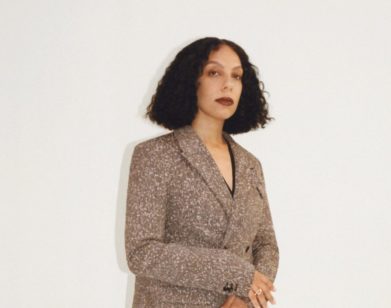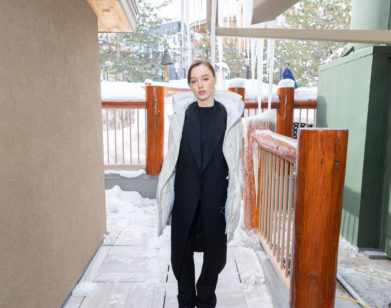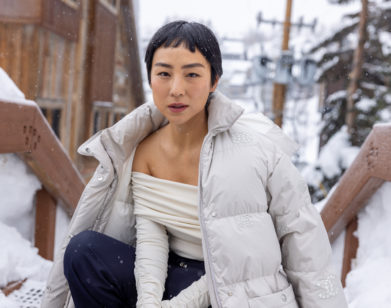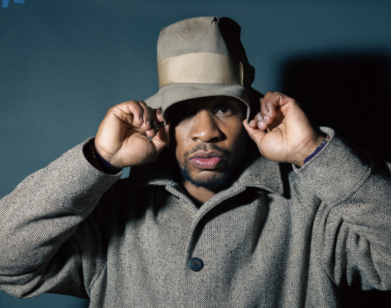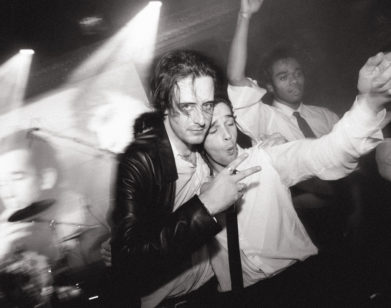In Conversation
Lashana Lynch and Little Simz on Real Strength and True Success
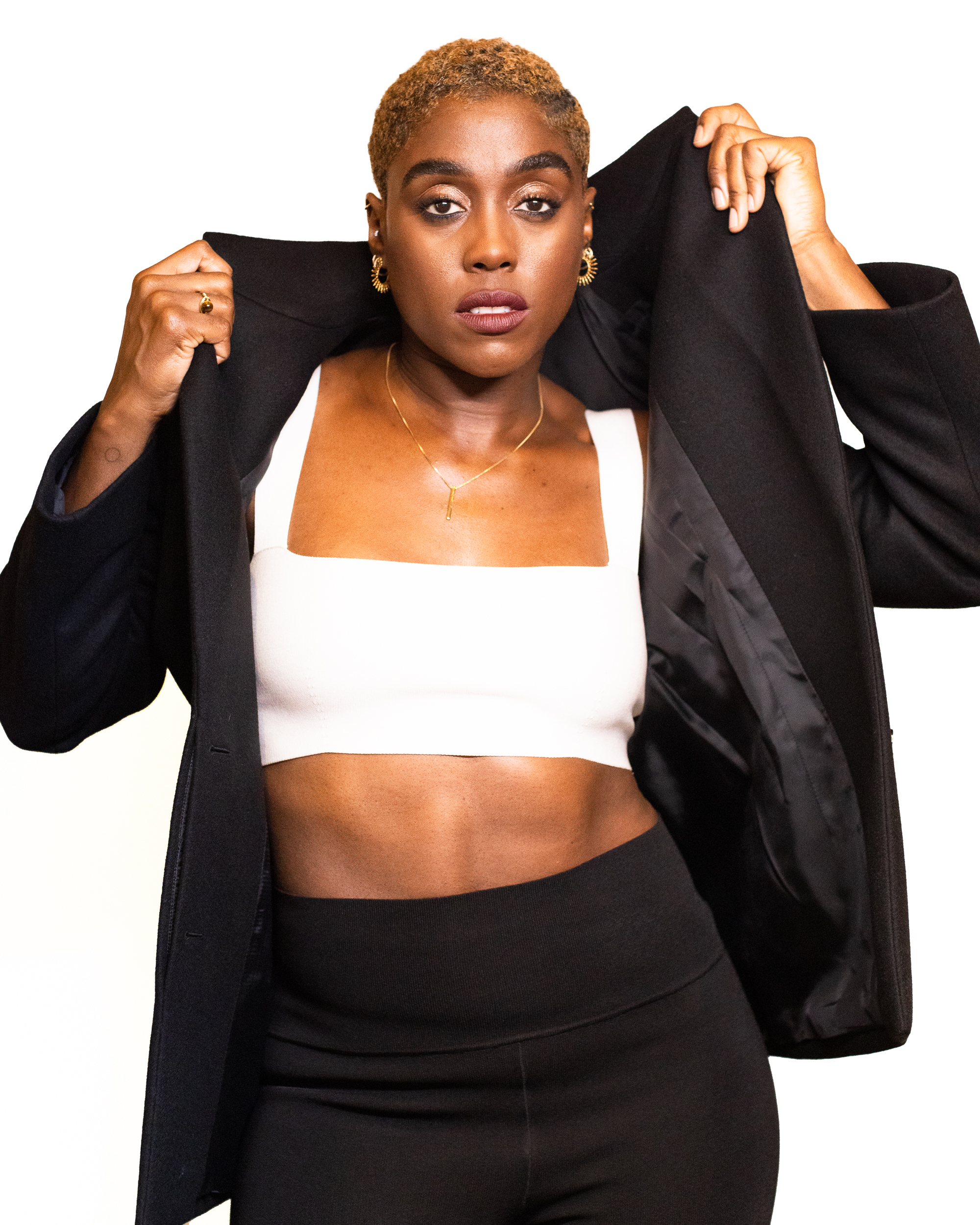
Lashana Lynch is no stranger to breaking barriers. In 2021, she became the first Black woman to play 007 in a James Bond film after six decades of the franchise, taking on the famous moniker alongside Daniel Craig in No Time To Die. Earlier this year, she fought shoulder-to-shoulder with Viola Davis, Thuso Mdubu, and Sheila Atim in Gina Prince-Bythewood’s stirring historical epic The Woman King. The revolutionary film follows the story of the real-life Agojie warriors, a group of women who fought for the protection of the Dahomey Kingdom in West Africa, and was shot on location in KwaZulu-Natal, South Africa and Capetown. It’s an intricately told tale of Black sisterhood, rife with complexity, lush landscapes, and heart-pounding battle scenes, buoyed by thrilling performances from Lynch and her castmates. Earlier this year, Lynch, who can currently be seen as a kind teacher in Netflix’s Matilda the Musical, got together with rapper, actor, and fellow Brit Little Simz for a heart to heart on finding their higher selves through their craft. —CAITLIN LENT
———
LITTLE SIMZ: Ready?
LASHANA LYNCH: Yes.
SIMZ I’m very happy to be doing this. Thank you for allowing me to interview you.
LYNCH: Thank you.
SIMZ Your proper madness is left, right and center. You’re doing what needs to be done. I know it’s one of the questions that we get a lot, but maybe just talk a bit about how this all began for you.
LYNCH: I sang before I acted, so I knew that I wanted to perform. I didn’t want to do musical theater, but I wanted there to be some kind of elevation from the performance aspect of being on stage. I didn’t know that would be acting. I had experienced some vocal issues that stopped my EP, and I was like, “Either I bust my balls to ensure that my vocal health is on 100, give myself a little break and then go back into it or I don’t procrastinate and just fall into something else that also makes me happy,” which was acting. Then I promised myself that I’d incorporate music or a musicality into everything I do with script work, whether that be rewriting lines with the director and ensuring there’s more of a rhythm between me and the character. Between them and their experience. Between me and the writer, ensuring there’s a flow. And then drama school for three years, I had a great time. Did one play when I left drama school, it was a lead and it was on stage for three hours straight. And I was like, “Oh, this is going to take grit.” So no procrastination, no sitting on the back foot, just straight in. And I’ve just committed to being straight in with everything I’m doing. Even if it’s five minutes on screen, just being on 100 so that I can look back and say, “Yeah, you did that.” The kids can be like, “My mom did that. She’s been doing that since the jump.”
SIMZ: Incredible, that’s it. And it’s mad how that worked. You didn’t let that stop you from your calling. When we get setbacks like that it’s hard to find the strength to switch mediums. We sit on one thing. And I guess going into this film, how did that even find its way to you? What was the process and that?
LYNCH: My team told me that Gina Prince-Bythewood wanted to speak to me about something. The excitement was real. Gina and I jumped on a Zoom and we talked about another project and I felt really bad because I was like, “Mm-hmm.” Trying to get past that so I could talk about The Woman King. And then I later found out she was doing the same thing. She’s one of the first directors to think of me for the role when writing the character before even connecting with me. I had just a rooted, grounded, very vibrational conversation with this woman that I’ve admired since Love & Basketball. And I was already able to get into what the experience is going to be for her. And I remember us sharing one thing that we both said, “That the way that we move, the way that we work is very guttural.” I can read a script and know it’s good and still be like, “Don’t think I should be playing that role though.” I feel like someone else needs that opportunity or that experience, or maybe I’ve done a similar thing before, or spiritually I just don’t feel connected to this story. When I read the script though, I was like, “Our own history, shot on the continent. We’re playing ancestors. What?” It almost didn’t make any sense because I’d been reading a lot of scripts that I’d had to insert myself into for a long time. I’d told my agent over the years, “Please, if the breakdown for the character says short, blonde, mousy girl, put me up for it, because you never know.” It’s in those choices that you find that you can really stretch yourself. You find elasticity in how you work. I read the script and it blew me away. I was angry that I didn’t know about these women and mad that not enough people shoot on the continent. It just riled me up in the most incredible way. And I was grateful that a Black female director saw me as a human being in order to even consider me for the role. And actually in how she learned who I was as a person was being at the Essence Black Women In Hollywood luncheon a few years back, where I was honored and I had to give a speech. And it was basically about being Black, British, Windrush generation, thanking our people and just showing gratitude for being Black. And she’d remembered that because she was in the room and I was like, “Wow, you really never know who’s sitting next to you, absorbing who you are.” And so I was grateful that she connected with me on that level.
SIMZ: Incredible. That’s wicked that she had you in mind from the genesis of it. It makes me proud to say, “Yeah, it’s one of us doing that.” I also just finished reading [Viola Davis’] autobiography and her journey is so inspiring. Talk to me about that as well, working with an OG.
LYNCH: I love that she calls herself an OG as well.
SIMZ: Does she? Own that.
LYNCH: She’s so nice. I love meeting good humans because you get to just really talk to who they are instead of who people think they are. There’s a misconception in what we do, that you, the artist, you the performer, has got it all figured out and you’ve been in this for so long that you don’t make mistakes because you’re on this streak of greatness. Everything is pristine. But she is a reminder of how to strike a balance between hard graft and taking care of one’s mental health. Watching her exist on set just with how she created this ensemble environment, not coming in as the Queen Viola Davis. She was in there, barefoot. She was on the ground shooting at 3:00 a.m. like we were, training probably harder than we did. Her trainer lived with her. She’s also not afraid of putting her hand up and saying, “I don’t really know how this should go. Let’s hear from the young folk, let them give their fresh perspective so that we can keep this moment alive in this scene.” But it is nice that it actually made me check myself. No matter how much experience you have and no matter where you are in your career, you’re still a human being. We are on this earth just to absorb and learn and unlearn and translate trauma into something great. She’s there for the tough conversations at all times.
SIMZ: Wicked. And even you mentioned her being open to collaborate, which is super important because you’re all artists. You bring different skills and your thing that makes you unique. That’s probably one of the things that makes her who she is. Where did you film, was it South Africa?
LYNCH: Yeah. In and around Cape Town.
SIMZ: Had you ever been to Africa prior to that?
LYNCH: No and it’s something that I’ll never take for granted, something that has changed me and reminded me of the work we need to do to inject life, money, and opportunity into the continent. Sony could easily have said, “We’re shooting on a soundstage in L.A. somewhere and we’re going to build sets and try to emulate these real spaces.” But the film that everyone sees is partly down to having the energy, the vibration of the land in the film, and being able to recruit a South African crew. Even on our days off, we were collecting energy in order to bring it back to work and let it live in the film. So yeah, it was wonderful. I look forward to shooting there again and giving our people the opportunity.
SIMZ: That’s incredible. And I love that as well, about having their presence guide you. I’d imagine there has to be a lot of letting go, actually surrendering to be used as a vessel.
LYNCH: Exactly.
SIMZ: And it sounds like you guys had that experience collectively and had each other in the process. How do you measure your growth, and how do you know you’re being challenged or stretched?
LYNCH: It usually starts with reading the script and feeling completely terrified of it. I don’t like to question myself and I don’t like to believe that I can’t do something. It’s not really in my nature to be like, “Oh, I’m not sure if I’m able to do it.” I will always make something work. I want to feel scared that I’m going to get it wrong or people are going to judge me or there’s a lot of responsibility. I want those questions to flag up because that’s usually the way that I need to run towards in order to stay present to why I even became an actor in the first place, which is to push past myself in order to make the world feel something. Even if it’s one person in the whole world, I’ve reached someone’s soul, which is no mean feat and is an honor to be able to do.
SIMZ: With The Woman King being very physically demanding, how was that process and training and how did you cope with that?
LYNCH: When I read the script and after speaking to Gina, I knew that the physical work that would be needed to undergo this character would help me find her and would hopefully help me find parts of myself. This is serious stuff. It’s not about me feeling a little bit tired because I’ve trained five days a week, or have come in on my day off. These women did not have days off. They couldn’t afford to, it was life or death. And I’ve never been given the opportunity to do my own stunts, to have a Black woman director believe in me enough to know that my body is capable. To have a stunt coordinator see my body and how I move and actually tailor the choreography according to my background in dance and athletics, and to actually celebrate my body and the Black female form. Every single actor in this movie has such a different body type that we were able to play to those strengths. I wanted Izogie to be powerful but not masculine. I wanted them to just see a calm power. We’re trying to represent how elegant the Black female form is and how beautiful muscles can be on women. It was nice to have a female trainer that felt that and nice to have a male stunt coordinator who honored that. It was the hardest thing I’ve ever done. It’s changed me forever. Training at that level does something to your spirit.
SIMZ: Hats off to you, man. What makes you feel safe on camera and on set?
LYNCH: I was just asked this today and I’m so glad that people care enough to ask because that should be the first question that artists are asked before even a photo shoot, when dealing with your body being exposed. There’s a number of things. It’s really important for the crew to read up on whatever the day entails so that they know exactly what the artist is experiencing. I’ve dealt with some tough narratives that aren’t easy to shoot. And if the crew doesn’t understand what it takes for a Black woman to go there, in the story or the performance, there are some things that can take you out of it. If there’s a white crew member that is giggling about something that happened with the light or the camera or whatever, it’s hard to not let that distract you emotionally. And on those days I took that quite personally and had to talk to Gina about everyone being on the same page. Whether that’s quiet on set for 10 minutes, whether that’s coming on set only to be still. I would like to see there be a culture shift in knowing that we are dealing with human beings here. We’re dealing with our bodies and our minds and we carry some of this stuff with every day or when we get home, and sometimes it’s hard to shift out of the space. Especially when you’re shooting on location. So what keeps me safe is knowing that even when I don’t have that, I can tap into my safety bubble. I can block out sound, block out energy, block out bad spirits. And that works on the Tube, it works in the supermarket, in places when you don’t have your headphones and things that take you out. I’m trying to learn how to take myself out.
SIMZ: That’s an incredible answer. It gave me shivers. Now, what is success to you?
LYNCH: That’s such a good question. You should actually do this on the side. Peace of mind. Absolute peace of mind. Knowing that everything that I have required or manifested personally is there when I’m at home. Home being your actual home or wherever you lay your head. I want to know that I can feel happy in my space. I can feel happy in myself. I can feel happy with my loved ones and nothing about the noise can penetrate me. That’s not something that people can steal. People can try and taint your career. People can try and taint your image, your brand. You could lose all your money that you earned over years, but if you’ve got your peace of mind, you won’t be rocked by the trivial things.
SIMZ: You’re getting crazy right now. That’s beautiful. There’s such a warped perception of what success is, especially when people look at people like myself, people like yourself. It’s tough. So, thank you for that.
LYNCH: And me saying it, I still need to practice it.
SIMZ: No, that’s amazing. And last question is, how is Lashana feeling at this time in her life?
LYNCH: Oh my gosh. I was so glad you did this. I’m feeling really loved. I’m very discerning about the people that I have in my life. I have 2.5 friends and it will probably stay that way forever. And everyone I have in my life respects and honors who I am at my core. They bring out my higher self and remind me of what’s important at every single moment. I feel loved in my soul, and sometimes you don’t get that. Some people don’t get to feel it in a whole lifetime.
SIMZ: That’s amazing. Well, you look like you’re feeling loved. You’ve got that love glow. I hope this has been cool for you. You’re so blessed, you are favored, you are loved, and you are appreciated. I really hope this movie and the many more to come, does whatever it needs to do for you and your career, your life. Stay glowing and stay happy.

